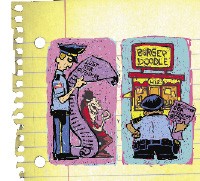Organizers hold our city’s first “Zombie Walk” on Beale Street, with volunteers dressed up as the living dead. One of the participants hoped it would become an annual event and told reporters, “Memphis has never seen anything like this.” Actually, it looked pretty much like any Saturday night on Beale Street.
 Greg Cravens
Greg Cravens
An ultrasound confirmed that the Zoo’s panda Ya Ya is indeed about to become a Ma Ma. Pandas rarely give birth in captivity, so if all goes well, the cub would be one of about a dozen pandas ever born in the United States. Meanwhile, the proud papa should be handing out cigars. What? Artificial insemination? Oh. Well, maybe whoever used the syringe — or however the heck they do it (we really don’t want to know) can do the honors.
Undercover police posing as truck drivers arrest 25 pimps and prostitutes at a truck stop on Lamar. “It’s Hard Out Here for a Pimp,” say Three 6 Mafia, and we learned it must be even harder for the women, since some of them wanted to charge the “truckers” only $20.
Ophelia Ford tells reporters she is not an alcoholic and then refuses to see her family when they drive to Nashville to help her out. Sigh. We’re pretty certain Ford will be in the news a lot in the next few months and not because of any work she does as a state senator.
More than a few MLGW employees have been making more than $100,000 a year with overtime pay — sometimes even doubling their already generous salaries. It’s just one thing after another at MLGW these days. Isn’t there another utility around here that we can use?
 Greg Cravens
Greg Cravens  Greg Cravens
Greg Cravens  Greg Cravens
Greg Cravens  Greg Cravens
Greg Cravens